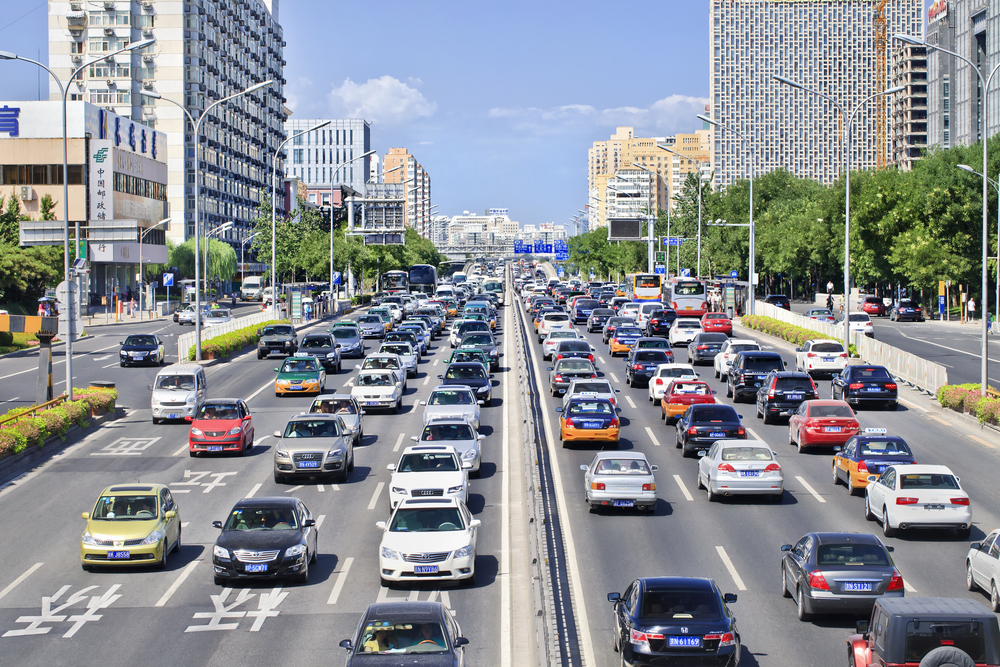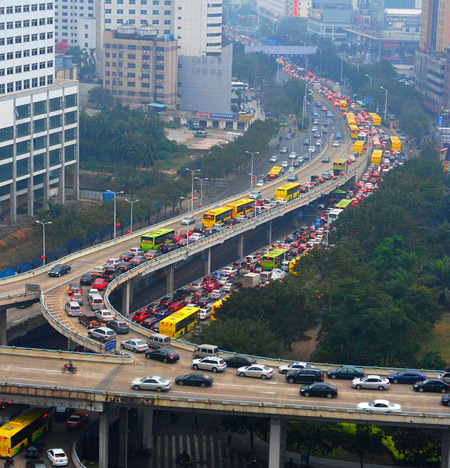Driving and Autos: Driving Conditions
The information below has been excerpted from the following: 1) the US Department of State's "International Travel" website (travel.state.gov/travel/), 2) the Australian Department of Foreign Affairs and Trade's "Smartraveller" website (www.smartraveller.gov.au), and 3) the UK Foreign and Commonwealth Office's "Foreign Travel Advice" website (www.gov.uk/foreign-travel-advice/). Additional information is available from these sources. World Trade Press annually assesses the information presented on this page.
United States: Department of State International Travel Information
While in China, you will encounter road conditions that differ significantly from those in the United States. Rules, regulations, and conditions vary greatly throughout China, but a general rule of thumb is that traffic safety is poor and driving in China can be dangerous.
Traffic is chaotic and largely unregulated, and right-of-way and other courtesies are usually ignored. The average Chinese driver has fewer than five years’ experience behind the wheel and the rate of traffic accidents in China, including fatal accidents, is among the highest in the world. Cars, bicycles, motorbikes, trucks, and buses often treat road signs and signals as advisory rather than mandatory. Pedestrians never have the right of way, and you should always be careful while travelling in, or even walking near, traffic. Child safety seats are not widely available in China, and most taxis and other cars do not have seat belts in the back seats. Motorcycle and bicycle accidents are frequent and often serious. If you decide to ride a bike or motorcycle, wear a helmet.
You may not drive in China using your U.S. driver’s license or an international license. If you have a resident permit, you can apply for a PRC driver’s license, although regulations for obtaining a license vary from province to province. Liability issues and the difficulty of passing the driver’s test may make it preferable to employ a local driver.
If you are involved in a traffic accident, stay calm; road altercations sometimes turn violent quickly. The safest course is to call the police and wait for them. Even minor traffic accidents can become major public dramas. In some instances bystanders have surrounded accident scenes and nominated themselves to be an ad hoc jury. The parties involved in an accident may offer money to the crowd in exchange for favorable consideration. If there are no injuries and damage is minimal, the parties often come to agreement on the spot. If no agreement is reached and the police are called, the police may mediate or conduct an on-site investigation requiring those involved to come to the police station to sign statements. Unresolved disputes are handled by the courts. In cases where there are injuries, the driver whose vehicle is determined to have inflicted the injury will often be held at least partially liable for the injured person’s medical costs regardless of actual responsibility for the accident. Many foreigners have been involved in incidents where the victims appear to have purposely caused accidents and claimed to have been injured in order to get payment for their supposed damages and medical care. When foreigners are involved in an accident, the police will sometimes hold their passports until the other parties are satisfied with the compensation they receive.
Please refer to our Road Safety page for more information. Also, we suggest that you visit China’s national tourist office and national authority responsible for road safety.
Australia: Department of Foreign Affairs and Trade Travel Advice
Travellers are permitted only in areas open to foreigners. Travel near military installations and near some border areas within China is restricted.
Foreigners wishing to travel to Tibet must apply for a Tibet Entry Permit issued by the Tibet Tourism Bureau. Applications for Tibet Entry Permits can only be lodged through specialised travel agents in China and travel can only be undertaken through organised tours.
Tibet, Qinghai, parts of Xinjiang, and western Sichuan are situated at altitudes over 3000 metres. Travellers in these areas may suffer from altitude sickness.
Travel and living conditions vary greatly between city areas and less developed rural areas. You may have trouble finding services such as banking, internet access and telephones, including mobile phone reception, in rural areas.
Poorly maintained roads and aggressive driving can make travel by road in China dangerous. See our road travel page.
Tour operators, public buses and ferries might not meet the safety standards you would expect in Australia, particularly in rural areas of the country.
You should contact your airline or travel agent for up-to-date information on flights and transport options, for both domestic and international travel.
United Kingdom: Foreign and Commonwealth Office Foreign Travel Advice
Visitors and tourists are not allowed to drive in China. Only foreign nationals with a valid residence permit may drive in China. You will have to pass a driving test and get a Chinese driving licence. An International Driving Permit is not sufficient. You must have valid insurance.
There are harsh penalties for driving under the influence of alcohol.
The poor quality of roads and generally low driving standards lead to many accidents. If you are involved in a serious accident, you may be prevented from leaving the country or detained until the case is resolved. Traffic accidents generally attract a large crowd of bystanders, some of whom may take sides (usually against the foreigner). If you are involved in an accident, call the police. You should leave vehicles in position until the police arrive. If there are no injuries and damage is minimal, the parties involved often come to an agreement on the spot. It is customary in China that the larger vehicle carries liability. In cases where there are injuries, you may be held liable for medical costs. You will also be held liable if you run over a pedestrian.
Copyright © 1993—2025 World Trade Press. All rights reserved.

 China
China 
